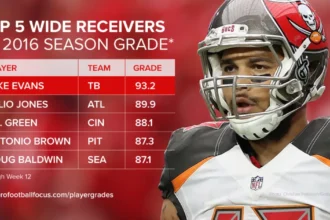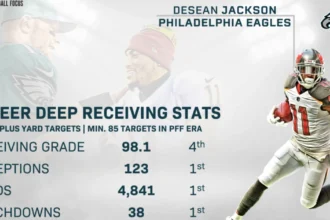The Baltimore Ravens vs Chargers Match Player Stats clashed in a thrilling “Monday Night Football” game on November 25, 2024, at SoFi Stadium in Inglewood, California. The final score of 30-23 in favor of the Ravens showcased a battle of grit, strategy, and standout performances. This game, dubbed the “Harbaugh Bowl” due to the sibling rivalry between coaches John Harbaugh (Ravens) and Jim Harbaugh (Chargers), was a showcase of individual brilliance and team effort. In this article, we’ll dive into the key player stats, highlight standout performances, and break down what made this game a memorable one. Whether you’re a die-hard football fan or just curious about the numbers, this breakdown is designed to be easy to read and understand for all ages.
Game Overview: A Tale of Two Halves
The Ravens (8-4) faced off against the Chargers (7-4) in a game that had playoff implications for both teams. The Chargers jumped out to an early 10-0 lead, but the Ravens roared back with five consecutive scoring drives, fueled by aggressive play-calling and a dominant ground game. The Ravens outgained the Chargers by 130 yards in the second half, ultimately securing the victory with a mix of powerful rushing, timely passing, and a stout defense. Let’s break down the key player stats that defined this matchup.
Baltimore Ravens: Offensive Standouts
Lamar Jackson (Quarterback)
Lamar Jackson, the Ravens’ two-time MVP quarterback, had a slow start but turned it around to deliver a stellar performance. After completing just 1 of 5 passes early, he finished the game with:
-
Passing: 16 of 22 completions (72.7%) for 177 yards, 2 touchdowns, and no interceptions.
-
Rushing: 3 carries for 15 yards, including a 10-yard rushing touchdown in the second quarter.
-
Highlight Play: Jackson’s 40-yard touchdown pass to Rashod Bateman just before halftime was a game-changer, traveling 57.4 yards in the air—his second-longest completion of the season. This play erased the Chargers’ early lead and shifted momentum to Baltimore.
Jackson’s ability to extend plays with his legs and make precise throws under pressure was key. His 117.3 passer rating leads the NFL, and this game showed why he’s a frontrunner for another MVP award.
Derrick Henry (Running Back)
Derrick Henry, nicknamed “The King,” was the engine of the Ravens’ offense. He powered through the Chargers’ defense, which ranked 10th against the run entering Week 12. His stats:
-
Rushing: 24 carries for 140 yards (5.8 yards per carry), with key runs of 19, 14, and 11 yards.
-
Fourth-Down Conversions: Henry was instrumental in converting two critical fourth-and-1 plays, wearing down the Chargers’ defense.
-
No Touchdowns: For the first time this season, Henry didn’t reach the end zone, but his physicality set the tone.
The Ravens are 5-0 when Henry gets 20 or more carries, and this game was a perfect example of how his relentless style opens up the passing game for Jackson.
Rashod Bateman (Wide Receiver)
Rashod Bateman stepped up big time, especially with his clutch plays in the passing game:
-
Receiving: 3 receptions for 65 yards, including a 40-yard touchdown catch in the second quarter.
-
Key Moment: Bateman drew a 12-yard pass interference penalty before his touchdown, setting up the score that gave the Ravens a 14-10 lead.
His ability to stretch the field and make tough catches gave the Ravens’ offense the spark it needed.
Mark Andrews (Tight End)
Mark Andrews, a reliable target for Jackson, made history with a gutsy play:
-
Receiving: 4 receptions for 36 yards, including a 6-yard touchdown in the fourth quarter.
-
Rushing: 1 carry for 2 yards on a historic fourth-and-1 quarterback sneak from the Ravens’ own 16-yard line. This aggressive call by John Harbaugh kept a crucial drive alive, leading to a score.
Andrews’ versatility and toughness were on full display, earning him an 85.9 PFF grade for the game.
Justice Hill (Running Back)
Justice Hill provided a complementary spark to Henry’s bruising style:
-
Rushing: 5 carries for 64 yards, including a 51-yard rushing touchdown in the fourth quarter.
-
Receiving: 2 receptions for 12 yards.
-
Impact: Hill’s touchdown extended the Ravens’ lead to 30-16, effectively sealing the game.
Hill’s speed and elusiveness added another dimension to Baltimore’s ground attack.
Justin Tucker (Kicker)
After a rough outing the previous week, Justin Tucker bounced back:
-
Field Goals: 1 of 1 (45 yards).
-
Extra Points: 3 of 3.
Tucker’s reliability helped ease concerns about his recent misses, contributing to the Ravens’ scoring output.
Baltimore Ravens: Defensive Standouts
The Ravens’ defense struggled early but clamped down in the second half, limiting the Chargers to just three points after halftime. Here are the key performers:
Nate Wiggins (Cornerback)
Rookie cornerback Nate Wiggins had a breakout game:
-
Tackles: 6 solo tackles.
-
Key Play: Wiggins delivered a big hit on Chargers’ wide receiver Jalen Reagor on a third-and-5, forcing an incompletion and a punt. He also had tight coverage on a deep shot by Justin Herbert, leading to a field goal instead of a touchdown.
Wiggins’ physicality and coverage skills earned him praise as one of the Ravens’ top defenders.
Kyle Van Noy (Linebacker)
Veteran linebacker Kyle Van Noy continued his disruptive season:
-
Sacks: 1 sack, contributing to the Ravens’ three sacks in the second half.
-
PFF Grade: 76.5, one of the highest on the defense.
Van Noy’s pressure on Justin Herbert helped limit the Chargers’ passing game in crucial moments.
Malik Harrison (Linebacker)
Harrison stepped up in the linebacker corps:
-
PFF Grade: 81.6, the highest on the Ravens’ defense.
-
Impact: Harrison’s run-stopping ability helped contain the Chargers’ ground game after J.K. Dobbins’ injury.
The Ravens’ defense, which leads the NFL with 35 sacks, showed its depth in this game.
Los Angeles Chargers: Offensive Standouts
Justin Herbert (Quarterback)
Justin Herbert started strong but couldn’t sustain the Chargers’ early momentum:
-
Passing: 21 of 36 completions (58.3%) for 218 yards, 1 touchdown, and no interceptions.
-
Rushing: 6 carries for 65 yards, including a 5-yard touchdown on the opening drive.
-
Challenges: Herbert took four sacks and missed five consecutive passes late in the fourth quarter, stalling the Chargers’ comeback hopes.
Despite the loss, Herbert’s dual-threat ability kept the game competitive, especially in the first half.
J.K. Dobbins (Running Back)
J.K. Dobbins, a former Raven, got off to a hot start against his old team but left the game early due to a knee injury:
-
Rushing: 6 carries for 40 yards (6.7 yards per carry).
-
Snaps: Only 19 offensive snaps before exiting.
Dobbins’ injury shifted the Chargers’ offensive balance, forcing Herbert to carry the load.
Gus Edwards (Running Back)
With Dobbins sidelined, Gus Edwards stepped in:
-
Rushing: 8 carries for 25 yards, including a 1-yard touchdown in the final minute.
-
Impact: Edwards’ touchdown cut the lead to 30-23, but it was too little, too late.
The Chargers’ run game struggled without Dobbins, managing just five carries in the second half.
Cameron Dicker (Kicker)
Cameron Dicker was a bright spot for the Chargers:
-
Field Goals: 3 of 3, including a 52-yarder before halftime.
-
Extra Points: 2 of 2.
Dicker’s accuracy kept the Chargers in the game, especially in the first half when they led 13-14 at the break.
Los Angeles Chargers: Defensive Standouts
The Chargers’ defense, ranked first in scoring defense (14.5 points per game), couldn’t slow down the Ravens’ balanced attack in the second half. Still, a few players stood out:
Kris Fulton (Cornerback)
Fulton had a mixed performance:
-
Pass Interference: Conceded a 12-yard penalty that set up Bateman’s touchdown.
-
Tackles: Contributed in coverage but struggled against Jackson’s passing attack.
The Chargers’ secondary allowed 177 passing yards, a respectable number against the NFL’s top offense.
Team Baltimore Ravens vs Chargers Match Player Stats Comparison
Here’s how the Ravens and Chargers stacked up in key team stats:
|
Category |
Ravens |
Chargers |
|---|---|---|
|
Total Yards |
389 | 285 |
|
Rushing Yards |
212 | 67 |
|
Passing Yards |
177 | 218 |
|
First Downs |
19 | 19 |
|
Third Down Conv. |
4/7 (57.1%) | 5/14 (35.7%) |
|
Fourth Down Conv. |
3/3 (100%) | 0/0 |
|
Turnovers |
0 | 0 |
|
Time of Possession |
30:57 | 29:03 |
The Ravens’ dominance in rushing yards and third/fourth-down conversions was a major factor in their victory. Their ability to control the clock in the second half (outgaining the Chargers 217-83) wore down Los Angeles’ defense.
Key Moments That Shaped the Game
-
Fourth-and-1 Sneak by Mark Andrews: With the Ravens trailing 13-10 at their own 16-yard line, John Harbaugh’s bold call to go for it on fourth-and-1 paid off. Andrews converted the sneak, keeping the drive alive and leading to Bateman’s 40-yard touchdown. This play was a historic moment, as no NFL team had ever gone for it on fourth down from their own 16.
-
Derrick Henry’s Dominant Runs: Henry’s 19, 14, and 11-yard runs on the Ravens’ first scoring drive set up Jackson’s touchdown. His physicality wore down the Chargers’ defense, which struggled to tackle him as the game progressed.
-
J.K. Dobbins’ Injury: Dobbins’ exit in the second quarter disrupted the Chargers’ offensive balance. Without their lead back, the Chargers leaned heavily on Herbert, who faced increased pressure from the Ravens’ defense.
-
Justice Hill’s 51-Yard Touchdown: Hill’s long run in the fourth quarter extended the Ravens’ lead to 30-16, putting the game out of reach for the Chargers.
-
Nate Wiggins’ Big Hit: Wiggins’ third-down stop on Jalen Reagor forced a punt, giving the Ravens’ offense a chance to take the lead before halftime.
Why the Ravens Won
The Ravens’ victory came down to three key factors:
-
Ground Game Dominance: With 212 rushing yards, led by Henry (140) and Hill (64), the Ravens controlled the game’s tempo and wore out the Chargers’ defense.
-
Aggressive Play-Calling: John Harbaugh’s decision to go for it on fourth-and-1 from the Ravens’ own 16 was a game-defining moment. The Ravens’ 3-for-3 success on fourth downs kept drives alive and demoralized the Chargers.
-
Second-Half Defensive Adjustments: After allowing 10 points early, the Ravens’ defense limited the Chargers to three points in the second half, sacking Herbert three times and shutting down the run game.
What’s Next for Baltimore Ravens vs Chargers Match Player Stats Both Teams?
Baltimore Ravens
The Ravens (8-4) solidified their playoff position as the AFC’s sixth seed. With a favorable schedule ahead, including a matchup against the Philadelphia Eagles, they’re poised to make a strong push for the AFC North title. Lamar Jackson and Derrick Henry will continue to be the focal points of their high-powered offense, while the defense looks to build on its second-half performance.
Los Angeles Chargers
The Chargers (7-4) remain in the playoff hunt as the AFC’s fifth seed but face challenges after losing J.K. Dobbins. Their 1-4 record against teams above .500 highlights the need for consistency against top competition. Justin Herbert’s health and ability to carry the offense will be critical in their remaining games.
Conclusion: A Game of Stars and Strategy
The Baltimore Ravens vs Chargers Match Player Stats was a showcase of individual brilliance and strategic mastery. Lamar Jackson’s dual-threat ability, Derrick Henry’s punishing runs, and bold coaching decisions from John Harbaugh propelled the Ravens to a 30-23 victory. On the Chargers’ side, Justin Herbert showed flashes of greatness, but injuries and defensive struggles in the second half proved costly. This game highlighted why both teams are playoff contenders and set the stage for an exciting finish to the 2024 NFL season.









